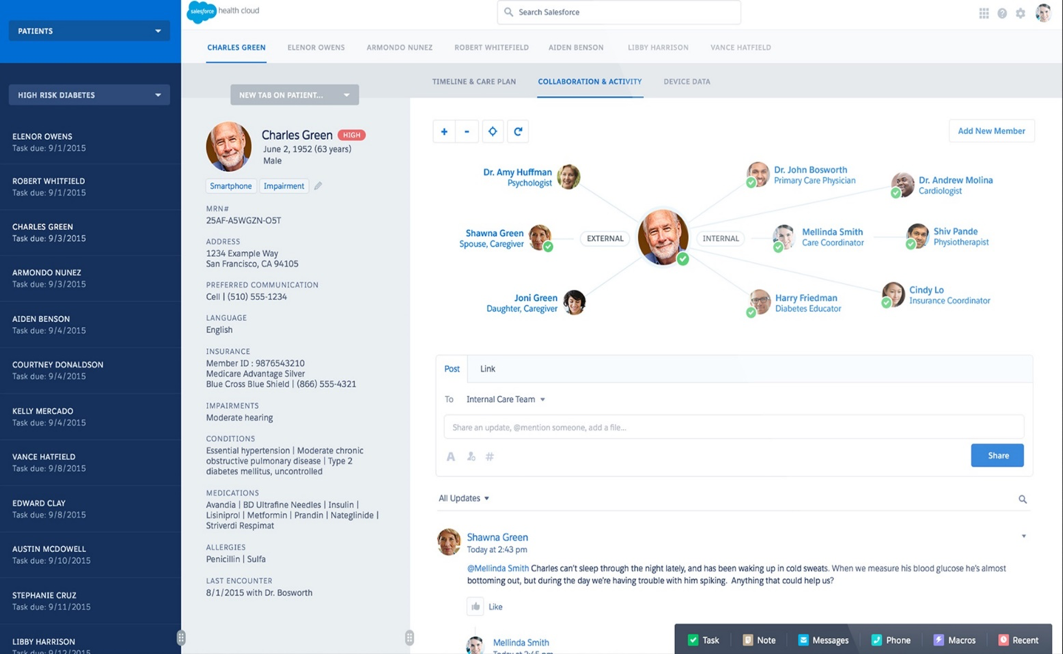A framework of these major events in the past five years, the salesforce roadmap is remarkably consistent with its previous iterations. Back in 2013, the company positioned the launch of its two earlier health cloud services as the first steps in a "multidimensional approach to health." At the time, however, the company announced HealthCloud for Hospitals and Health Cloud for Health Systems, along with a visual storytelling application that showed the various use cases of both.
As the company stated then, it viewed the future as consisting of a "full continuum of care." That clearly expanded to incorporate virtual care as well as telehealth services. Last year, with the release of Quip for Health, the company stated its broader goal of transforming healthcare through AI, ML, and analytics. The launch of the integrated Health Cloud for Businesses service is the latest in this evolution, aiming to extend the breadth of its vision and extend the company's reach beyond the hospital.
It was just several years ago when the company had initially deployed its Salesforce Health Cloud for healthcare organizations and hospitals alike -- a strategic decision that was designed specifically to appease healthcare, system and information technology professionals. Five years later, the company has doubled down on its commitment to this market and will once again prove it can change the way healthcare is delivered. With Health Cloud for Businesses, we are delivering on our mission to redefine health in a way that's never been done before. Our goal is to disrupt the current delivery model for business and health," said Keith Block, co-founder and CEO of Salesforce.
In the company's most recent press release, Block reaffirmed the company's commitment to the healthcare industry: "While health care is all about people, it has also been overwhelmed by costly, inefficient processes. With this new, powerful offering, Salesforce Health Cloud for Businesses, we will expand the power of healthcare to deliver on our core purpose of helping companies be successful."
In recent months, the company has continued to create connections with other partners, including Twilio and Oracle. A customer asked the question "Will this be the killer app for Salesforce?"
Health Cloud for Businesses will introduce health solutions to private and public organizations around the world, enabling a smoother exchange of patient information among providers, payers, and patients. The company described the full set of solutions:
Salesforce AI for Health: The company is partnering with IBM Watson Health to bring AI and machine learning to the health industry.
The company is partnering with IBM Watson Health to bring AI and machine learning to the health industry. Health Cloud for Analytics: Integrations with Oracle Carelink and Carecenter will enable healthcare providers to connect, analyze, and manage healthcare data.
Integrations with Oracle Carelink and Carecenter will enable healthcare providers to connect, analyze, and manage healthcare data. Health Cloud for Healthcare Informatics: A mobile-first offering to capture patient and provider insights in an on-the-go way.
A mobile-first offering to capture patient and provider insights in an on-the-go way. Health Cloud for Real-Time Prescription: A new business intelligence and analytics solution that connects medical professionals, pharmaceutical manufacturers, and regulatory agencies to monitor the efficacy of drugs and devices.
A new business intelligence and analytics solution that connects medical professionals, pharmaceutical manufacturers, and regulatory agencies to monitor the efficacy of drugs and devices. Health Cloud for Telehealth: Health Cloud for Telehealth features a Telehealth Optimization Solution, which combines Salesforce's expertise in healthcare with expert advice from senior executives from GE and Philips.
Health Cloud for Telehealth features a Telehealth Optimization Solution, which combines Salesforce's expertise in healthcare with expert advice from senior executives from GE and Philips. Health Cloud for Oncology: Providers and patients can connect with a secure healthcare platform that connects health data with existing electronic health records and clinical workflow solutions.
Salesforce stated that the company has been working with organizations to help it design and build new solutions, including Kaiser Permanente, Phoenix Children's Hospital, Providence St. Joseph Health, and Children's Mercy Hospitals and Clinics.
Additionally, the new offering will be compatible with the G8 Global Alliance for Healthcare Information Systems (GHAS), which is composed of 21 international organizations.
In a press release from Salesforce, David Dill, Salesforce's vice president and global head of healthcare, said, "The alliance will give Salesforce a powerful partner for accelerated innovation in this market, connecting physicians and care teams with the right information at the right time to improve health outcomes. Our products work together seamlessly so that healthcare organizations can improve outcomes for their patients, and streamline healthcare operations."

The Business-to-Business Model
As an enterprise cloud software company, Salesforce offers products and services for various industry segments, including insurance and financial services, retail, manufacturing, education, and healthcare. It's increasingly relied upon by large, global companies to power its businesses, but it remains to be seen how it will manage to attract and retain a following among healthcare organizations.
For Salesforce, that shift to business-to-business offerings would make sense. In an interview with The New York Times in May 2016, Timmons A. Bell, Salesforce's vice president of strategy and corporate development, stated that "The customer is ready for it now."
But Salesforce is not a pure business-to-business offering like Microsoft Dynamics or SAP SuccessFactors, which target more specialized industries. It still requires that healthcare organizations use its cloud service to connect with their existing systems, creating a complex relationship. For example, Salesforce and CareStar Health are creating an "intelligent health record platform" to manage "payor, provider, and patient data."
CareStar Health CEO Rona Barrett has stated that the alliance with Salesforce is the next logical step in the company's efforts to better connect physicians and patients, and that her organization has deployed more than 100 Salesforce solutions in order to achieve that goal.
Looking Ahead
Salesforce stated that its collaboration with Oracle will accelerate its approach to the healthcare industry, adding that "By connecting the power of CareStar's data, people, and process with the power of the world's #1 CRM, we will make healthcare a higher performing, more efficient business."
Salesforce, however, has to tackle several challenges in healthcare, including legacy systems, fragmentation of information, and lack of interoperability. Because the healthcare industry often does not move as quickly as some industries, customers have a number of different healthcare systems to use.
The challenge for Salesforce and other industry players is to create products that can easily tie all the various systems together, while the partnership with Oracle will likely benefit both companies, as it will give Salesforce another solution to serve the healthcare industry.
The Oracle-Salesforce Partnership
Oracle's acquisition of NetSuite for $9.3 billion has certainly raised questions as to the future of Oracle in the technology space. Oracle's market share and growth rate have fallen behind that of IBM and Microsoft, who are known to have a higher focus on cloud computing.
And as Salesforce integrates with more and more enterprise companies, IBM and Microsoft will have the opportunity to target Salesforce's business-to-business (B2B) solutions. For example, IBM announced in August 2016 that it would bring its artificial intelligence platform Watson to the public cloud for the healthcare market. This partnership could help both companies challenge Salesforce and others in the enterprise CRM space.
With the health industry facing fragmentation, coupled with regulatory and regulatory uncertainty, it will be interesting to see if the alliance with Oracle will help Salesforce achieve its goal to help healthcare organizations.
Bob Skelley is the VP of advocacy, communications, and policy for the World Policy Center. He is a member of several government and nonprofit boards and has more than 40 years of experience in communication, government, and advocacy. He is a former publisher of the New Orleans Times-Picayune, former President and CEO of the National Council of Nonprofits, and former Senior Vice President of Public Policy and Government Affairs at The Becket Fund for Religious
